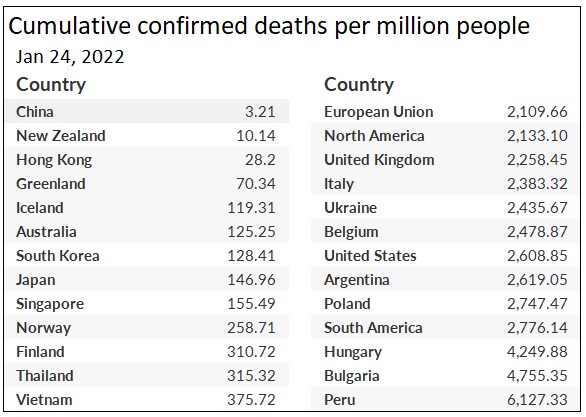The advent of the present, nCoV-2 (Covid-19), pandemic:
|
In December 2019 a Chinese doctor noticed patients suffering from a viral disease circulating in the wet markets in the City of Wuhan and initially thought it was a fresh outbreak of SARS (severe acute respiratory syndrome). As a result the markets were closed on January 1 2020. By January 5 SARS was ruled out. On January 7 Chinese researchers warned the WHO (World Health Organisation) that they had identified a new virus, named 2019-nCoV, and the WHO immediately warned relevant health authorities around the World. In addition, the Chinese had provided the full genome of the virus to the world's principal reference laboratories including: the US-CDC's Respiratory Viruses Diagnostic Laboratory in Atlanta; the Japanese Nagasaki Institute of Tropical Medicine and the Australian Infectious Diseases Reference Laboratory in Melbourne. Using the Chinese genome information, the US Center for Disease Control and Prevention (CDC) was able to confirm the first case in a Seattle hospital on January 21. The US citizen had recently returned from Wuhan. US doctors and scientists sounded the alarm and called for the immediate quarantine of travellers from China. This was actioned in Seattle but ignored by Washington. On January 23 the cities of Wuhan, Xiantao and Chibi in Hubei province were placed under effective quarantine, as air and rail departures were suspended. By the end of the week, more areas were placed under lockdown, affecting a total of 56 million Chinese people. This was well publicised across the world, with scenes of doors being locked and even welded shut. It was also reported, with overt condemnation, that China: "has used drones equipped with speakers to force citizens to wear face masks and had shut down 16 cities across the country and... China’s railway operator is using 'big data' to track down passengers who were in the same carriage as those who contracted the virus." On January 25, in Australia a man, who had returned from Wuhan to Victoria, tested positive to SARS-CoV-2. The same day (the 25th) President Trump tweeted (account suspended): China has been working very hard to contain the Coronavirus. The United States greatly appreciates their efforts and transparency. It will all work out well. In particular, on behalf of the American People, I want to thank President Xi! The following week (on Jan 31) amid, growing concerns about the draconian nature of the Chinese lock-down, WHO director general, Dr Tedros Adhanom Ghebreyesus tweeted: "The speed with which #China detected the outbreak, isolated the virus, sequenced the genome and shared it with WHO and the world are very impressive. So is China’s commitment to transparency and to supporting other countries." Yet media outlets in the West continued to condemn the Chinese actions. For example, Frances Eve from Chinese Human Rights Defenders who wrote, in The Guardian (on Feb 2), that China's reaction to the coronavirus outbreak violates human rights and that: "The WHO should abide by its own human rights principles and demand the Chinese government end its censorship and police suppression surrounding the coronavirus outbreak." By this time cases of the novel coronavirus had been identified in a dozen countries. In response to the obvious danger Australia closed its borders to China (on February 2) and the Prime Minister, Scott Morrison, announced Australia’s travel advice had been raised to level four – “do not travel” as the number of deaths worldwide rose to 260 and the estimated number of people infected worldwide was reported to be around 12,000 (a significant underestimate). Australian citizens, permanent residents and their immediate family, arriving out of mainland China (not just from the Hubei province) were immediately required to self-isolate for a period of 14 days. At that stage Australia had identified only 12 people who were infected and placed them in isolation. There were no deaths. Yet it was soon evident that Iran and Italy had a serious problem and the travel restrictions were extended first to Iran and then to other 'hot spots'. The Chinese Government initially objected to Australia's border closures that impacted many students. Yet these combined with very strict quarantine for travellers (under guard) turned out to be quite effective in supressing it's spread with outbreaks, all due to quarantine breaches, generally eliminated by comprehensive contact tracing and enforced isolation. Meanwhile in the US, President Trump refused to act, dismissing the virus as trivial, before embarking on a campaign of obfuscation, misinformation and inaction for the remainder of his term in office. As a consequence of his inactions and those of other national leaders like; the British Prime Minister, Boris Johnson, a viral outbreak in China, that was soon brought under control there, became a worldwide pandemic. |
As the two years passed at least six million had died. Yet, there have been distinctly different experiences in different countries, largely depending upon the degree to which governments have been prepared to sacrifice lives in the hope of maintaining economic activity; or minimising government expenditure; or containing civil disobedience; or avoiding electoral defeat.
The following table comes from Our World in Data (second birthday records - selected examples only)
 The left-hand side are countries that have managed to minimise deaths,
The left-hand side are countries that have managed to minimise deaths,
while those on the right are countries and regions that have not.
Clearly it helps to be an island. And yet Canada has a third of the death rate of the United States;
while Norway and Finland have a fifth of Sweden's.
Perhaps they have a more cohesive and therefore cooperative populous?
Nevertheless, worldwide the Covid-19 pandemic has caused economic chaos everywhere, principally through disruptions to commerce, travel and related services.
Many jobs have been lost. Government assistance to shore-up the various economies increased debt and deficit spending that will have on-going repercussions for years to come.
As already indicated the saviour has been modern science and in particular vaccination.

